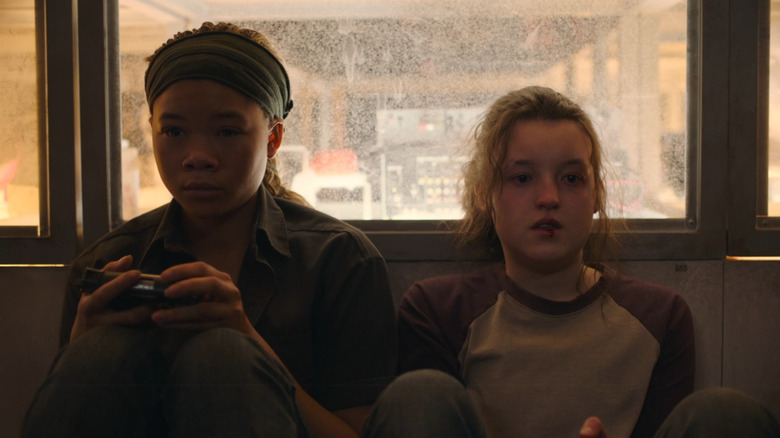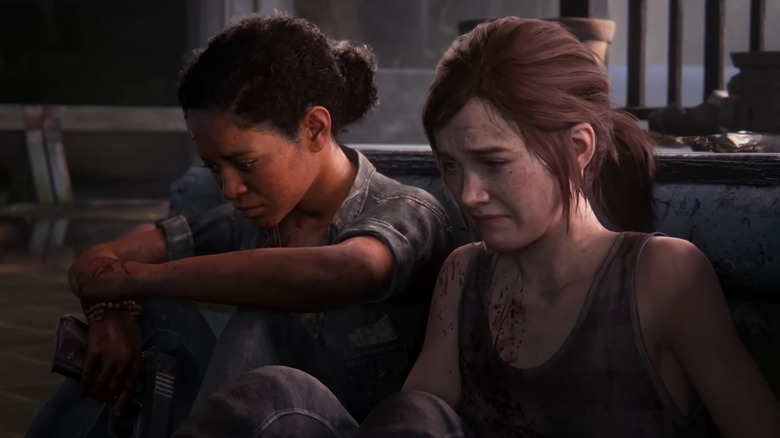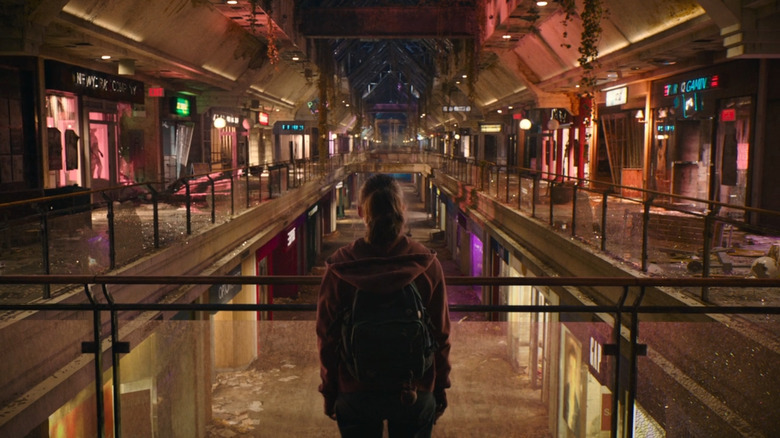Ellie Gets Infected Differently In The Last Of Us Show Than The Left Behind DLC
So far, HBO's "The Last of Us" has been a fairly faithful adaptation. It keeps everything that worked about the original game, while changing whatever's necessary to better fit the medium of TV. The latest episode, "Left Behind," makes another major yet intuitive change: it takes the downloadable expansion pack game (also titled "Left Behind"), released nearly a year after the original videogame, and it adapts it here instead of later. (If the showrunners had chosen to make "Left Behind" a one-off special between seasons, no one would've blamed them.)
The result was an episode that captured both the joy and heartbreak of the original "Left Behind," while also neatly contributing to the season's themes of refusing to let go of the people you love, no matter how much of a lost cause it may seem. It wasn't a one-to-one adaptation, of course: they cut a lot of Ellie's (Bella Ramsey) and Riley's (Storm Reid) time messing around in the mall. They also cut a lot of Ellie's present-day storyline, where she goes hunting through the neighborhood for some more medical supplies for Joel (Pedro Pascal). But when it comes to capturing the heart of the expansion game, this episode knows exactly what to keep.
The other big change they made was the manner in which Ellie and Riley get infected. In the game, Ellie and Riley are chased by a whole hoard of infected, whereas here they're attacked by just one of them. It's an interesting change, one that seems a little counterintuitive on the surface. Why choose to only give us one infected, when several of them would've been a lot scarier?
Emphasizing how much Ellie's grown
Throughout the first six episodes, Ellie mentions to Joel that her school in the QZ was terrible. This becomes especially clear in this episode's horror sequence with the lone infected man, when we realize that Ellie's never been taught that the infected need to be stabbed in the head specifically. This seems like pretty crucial information to give to kids who are growing up in a zombie apocalypse, but it seems like FEDRA figured this would be a good way to punish those who break the rules and wander out of bounds like Ellie does. The kids most likely to find themselves attacked by the infected are also the kids most likely to leave the QZ and join the fireflies, so keeping them ignorant seems like a good way to ensure their rebellions won't last. For a school run by a bunch of "fascist dickheads," as Riley puts it, this logic seems par for the course.
There's also the way this fight emphasizes how young both Riley and Ellie are. They're so green that they can't yet handle even a single infected, a stark contrast to how much of a badass Ellie's becoming in the present day. Ellie's slowly reaching the point where she'd be able to handle this sort of incident without breaking a sweat. That sounds like a clear-cut good thing, but it's also going to make this memory all the more agonizing in hindsight. That feeling of "if only I knew what I know now," is just going to get worse the more Ellie looks back at this moment.
A less action-packed adaptation
The use of only one lone infected man is part of a general trend in "The Last of Us" of cutting down on the amount of action in the game. After all, this isn't a video game anymore, so extended sequences where Joel and Ellie have to fight and sneak around countless, nameless enemies are now best used sparingly.
As a result, the infected on this show only pop up once or twice an episode. That might sound boring, but in addition to helping the show stay character-focused, it also helps make the infected seem so much more terrifying than their videogame counterparts. Whereas the game characters survive most of their interactions with them, nearly every time the infected have shown up in the show, someone's gotten bit. The fact that the show has also held back on showing us the worst of the infected — we've only seen one bloater, and nobody managed to kill it — also helps to make them feel far more threatening.
The show understands that zombies get a little less terrifying every new time we see them, so they've been playing it smart and only using them for short bursts of horror. It's just one of the many ways the HBO series avoided the usual video game adaptation curse, never forgetting that its main goal is to make a good TV show, not just replicate the game.


